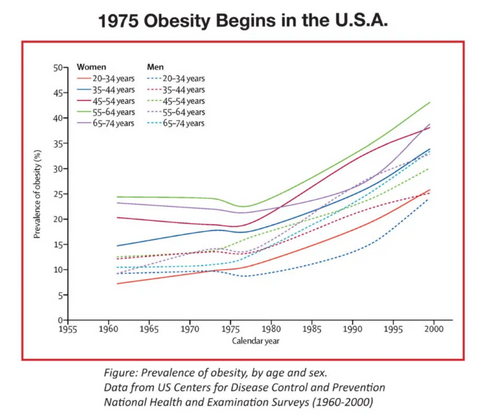I sat down over lunch to watch a little YouTube. What popped up in my feed was a video on The Obesity Industrial Complex, which seemed well produced and struck some chords with me.
We've probably all heard of the Military Industrial Complex, which entails a range of corporations that are perversely incentivised by war profits. The Obesity Industrial Complex concept is similar.
Big Pharma Can Save Us From Big Food
Around just 15 minutes in length, the clip is well worth a watch. It starts with a critique of a 60 Minutes piece that aired earlier in the year in the US and goes on to explain the relationship between the main actors in this particular industrial complex.
First up, Big Food is incentivised to addict us to their products rather than to nourish us, which means they are made cheaply and devoid of nutrition or fibre, which in turn makes us sick (and obese). The cheaper the food can be produced, the more profitable Big Food can be.
Meanwhile Big Pharma is incentivised to avoid any meaningful discussion around non-pharmacological remedies such as eating vegetables, reducing sugar, exercising, fasting, etc. Nope. The idea is that we should just take our pills.
Mainstream Media stay out of any moral debate and just focus on selling ad spots. Lame Duck Government plays along, enjoying the perks that come from the corporate lobbyists.
Intentional or not, no party in this equation has any incentive to change the status quo that makes them money. This presents a large, complicated codependency where more sick people are actually good for business.
"Obesity Caused by Genetics"
Enter the Expert. In the video, narrator and writer James Li starts out with Dr. Fatima Cody Stanford - an obesity "expert" - being interviewed on the 60 Minutes episode claiming that obesity is "a brain disease" and the "number one cause of obesity is "genetics" regardless of optimal diet, exercise or other actions we may take. The interviewer looks flummoxed as most of us would be when hearing such an argument.
I certainly don't buy it. We've all seen our grandparents or photos of other humans from 50-60 years ago, and they were remarkably slim compared to today. Even old research shows average BMI scores blowing up over time. The chart and information shown in this research is also mind-blowing and worth seeing.
According to the video's producer, neither the good doctor being interviewed nor CBS who aired the show disclosed that she has been paid significant sums of money from several major pharmaceutical companies, including the one sponsoring the show. Despite her credentials, one could argue that she is nothing more than a paid actor.
Worse, apparently the segment did not mention any solutions to the obesity problem other a single drug, leading another critic to cite this particular episode of 60 Minutes as a "Shameful, Dangerous, Irresponsible Drug Commercial". I rarely watch it but you have to wonder if this show was representative of 60 Minutes' standards?
Systemic Conflicts of Interest
Doing a little Googling about all this I am also somewhat horrified to see that Dr. Stanford has now been promoted to the 2025 Dietary Guidelines Advisory Committee where she will advise on food regulation under the United States Department of Agriculture (USDA) and the Department of Health and Human Services (HHS).
How can someone so compromised be put in charge of food supply regulation? How can someone who believes that we don't need to investigate the root cause of the problem, but rather all we need are some new pills be right for this role?
Because she is paid to ignore the facts and say what her corporate sponsors (the very same companies paying for the advertisements) need her to say. With paid actors like Dr. Stanford in the drivers seat, the problem is both deep and systemic. This certainly seems symptomatic of an Obesity Industrial Complex in the USA at least.
Prevention is the Best Medicine
I don't believe anyone who reads this blog post would agree that Big Pharma is the only solution as Dr. Stanford infers. To list just a few top of mind ideas on preventative non-pharma solutions we could consider:
- Introduce competition and remove the duopoly in our supermarket sector - this simply has to happen, though the subject appears to have gone cold in the media despite worsening cost of living challenges. (One person I spoke with suggested this may be related to advertising revenues.)
- Introduce a "sugar tax". This has been proposed and seems worth exploring, however no government wants to touch it. I found a Treasury publication that suggests that all a price hike will do is send people to some other bad food. Like taxing cigarettes sent people to vape?!? (The paper seems well written, but the author was just out of an internship and wrote the paper entirely from an economic rather than a health perspective.)
- Introduce a "processed food" tax (or increase tariffs on imported products). Another one that has been proposed but seems to disappear once the initial fuss is over.
- Remove GST on "raw" food such as fruit and vegetables. This appears to have been thrown in the "too hard" bin by national media, and government. Seriously? How hard is it to define what is exempted and what is not? It is raw with no additives = no GST.
- Subsidise growers so they don't need to export all the good stuff. (I have paid the less for New Zealand asparagus in Tokyo suburbs than I have at my local Auckland supermarket, just saying.)
- Provide quality food in public schools (as private schools can afford it themselves). We come from Japan and have seen how this works, for the better! Not only would be boost jobs, but it would boost health and alleviate poverty. But again, this one has been conflated as "too difficult" etc etc.
I don't have the answers but it seems our politicians only go for the low hanging fruit - excuse the pun. None of the current crop are brave enough to wade through the "noise" and tackle the big challenges around healthy food supply.
I think we need to make sure our politicians hear our voices on food safety, health and wellness, and for there to be conversation around non-pharma solutions. Surely there is one politician brave enough to take a stand and fight the FUD - fear, uncertainty and doubt - that inevitably comes out to reject any proposals to change the status quo.
It is election year and if the politicians don't listen we need to vote for the ones that do, as we all know that prevention is the best medicine.
NOTES:
Here are some charts from a couple of the articles I linked above:
THE 60 MINUTES SEGMENT ON OBESITY WAS A SHAMEFUL DANGEROUS IRRESPONSIBLE DRUG COMMERCIAL

A TIMELINE OF THE INCREASE IN CONTRIBUTION OF REFINED SUGAR AND HIGH FRUCTOSE CORN SYRUP

NEW ZEALAND OBESITY RANKING:

https://www.otago.ac.nz/news/itunesu/podcasts/otago022513.mp4


